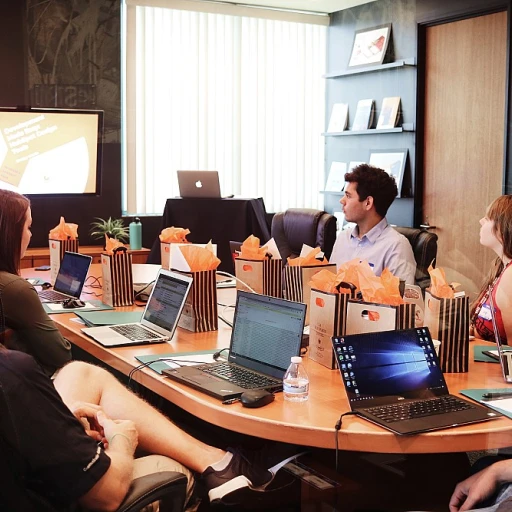
The Evolving Role of Talent Acquisition Specialists
Transformative Role of Talent Acquisition Specialists
The role of a talent acquisition specialist in today's hiring landscape has evolved significantly. With companies recognizing the influential impact of a candidate's first impression, the position of these specialists has become more crucial than ever. A talent acquisition specialist is more than just a recruiter; they are integral players in shaping the candidate experience. They work closely with hiring managers to ensure the recruitment process aligns with the company's long-term goals and portrays an employer brand that attracts top talent.
Incorporating technical expertise, these specialists devise recruitment strategies that streamline the process from initial job application to onboarding. Their ability to strategically handle applicant tracking systems and apply human-centric recruitment techniques sets the stage for a positive experience. This is crucial as candidates today often base their employment choices on the initial interactions they have with a company.
The job description of a talent acquisition specialist extends beyond filling positions. It includes creating a welcoming environment that engages candidates and leaves a lasting impression. They are expected to master various skills such as analyzing job descriptions, assessing cover letters, and even understanding the nuances of social media engagement. By honing these skills, they not only improve the immediate hiring process but also contribute to retaining talent in the long term.
As a talent acquisition specialist takes on senior roles within HR teams, they often lead initiatives aimed at refining the entire candidate journey. In doing so, they require a strategic mix of empathy, efficiency, and role-specific expertise to address key challenges in candidate experience. Effective pre-hire assessments are a part of this evolving landscape, offering valuable insights into a candidate's fit within a company.
Key Challenges in Candidate Experience
Challenges that Talent Acquisition Specialists Encounter
Navigating the complexities of candidate experience is no small feat for talent acquisition specialists. These professionals juggle a myriad of tasks aimed at ensuring a seamless recruitment process. One of the most pressing challenges is managing candidate expectations. In a competitive job market, candidates are often well-researched and have high expectations of the hiring process. Acquisition specialists must work closely with hiring managers to ensure a smooth and transparent process that reflects positively on the company. Another challenge is maintaining clear and consistent communication. Candidates often report feeling left in the dark during the recruitment process, which can significantly harm their perception of an employer. To combat this, acquisition specialists must hone their communication skills and ensure that candidates are updated regularly. The use of technology in the hiring process also presents hurdles. While applicant tracking systems and other technologies can streamline recruitment, they sometimes result in a more impersonal candidate experience. Specialists must strike the right balance, leveraging technology while maintaining a personal touch. Moreover, tailoring recruitment strategies to attract top talent adds another layer of complexity. Crafting job descriptions that both accurately represent a role and appeal to potential candidates requires a delicate mixture of creativity and technical know-how. Lastly, specialists face the pressure of balancing speed with quality. While it's vital to fill positions promptly, it's equally important to ensure that the candidate is the right fit for both the role and the organization's culture, which demands a keen eye for talent evaluation. To explore an in-depth analysis of recruiter compensation and its influence, refer to this detailed guide.Strategies for Improving Candidate Experience
Strategies to Elevate the Candidate Journey
Enhancing the candidate experience is a crucial element for talent acquisition specialists aiming to secure top talent. A seamless recruitment process not only increases the likelihood of candidates accepting job offers but also boosts overall satisfaction. Here are some practical strategies that talent acquisition teams can employ to optimize the candidate journey:- Streamline Communication: Clear and timely communication is essential. Candidates should never feel lost in the process. Regular updates through emails, phone calls, and status notifications in applicant tracking systems can make a significant difference.
- Offer a Personalized Experience: Tailoring the recruitment process to meet individual candidate needs can create a more welcoming atmosphere. This involves understanding the candidates' career aspirations and aligning job descriptions and roles accordingly.
- Leverage Technology: Utilizing advanced recruitment tools and platforms can enhance efficiency. This includes optimizing applicant tracking systems to manage cover letters and resumes more effectively in the hiring process.
- Engage with Social Media: Utilizing social media platforms for recruitment can reach a broader pool of potential candidates. Social media also allows company culture to be showcased, which plays a pivotal role in attracting candidates.
- Provide Feedback: Constructive feedback, even for candidates not selected, can be incredibly valuable. It shows respect and professionalism, leaving a positive impression that reflects well on the company's brand.
- Enhance Onboarding: The experience doesn’t end at the offer. A comprehensive onboarding process can set new hires up for success and reinforce the positive image of the company in the eyes of the candidate.
The Impact of Employer Branding
Amplifying Company Image to Boost Attraction
In the realm of talent acquisition, employer branding plays a pivotal role in shaping the candidate experience. It's more than just the aesthetic appeal of a career page on a company's website; it's the entire personality and culture of the organization as perceived by potential candidates. For acquisition specialists and hiring managers, developing a strong employer brand can significantly affect recruitment outcomes. Historically, employers may have overlooked the role of branding in the hiring process, yet in today's competitive job market, it's a cornerstone of successful recruitment strategies. By crafting a compelling narrative about the workplace culture, company values, and career growth opportunities, organizations can attract top talent more effectively.Crafting the Right Message
Recruitment teams must collaborate closely with marketing departments to create content that accurately reflects the company's mission and culture. This includes not only job descriptions but also social media presence and other communication channels that might influence a candidate's perception. For instance, what the company posts on LinkedIn or shares via its official blog can offer candidates insight into what it might be like to work there. Moreover, shining a spotlight on employee testimonials and showcasing the experiences of current employees can serve as powerful endorsements, further enhancing the company's image in the eyes of potential applicants. Human resources and communication teams should actively engage in crafting and disseminating these narratives.Engaging the New Generation of Candidates
Employer branding must also evolve to resonate with varying demographics, particularly younger candidates who often prioritize values alignment and social responsibility when choosing a potential employer. By highlighting community involvement or sustainability efforts, a company can appeal to the ethical priorities of younger job seekers. For senior roles, emphasizing career advancement and leadership opportunities can be more effective. Recruitment processes should be tailored to different talent pools to ensure alignment with their specific expectations and career aspirations.Employer Branding as a Long-term Investment
Finally, it's crucial to recognize that building a strong employer brand is not a one-time effort but rather a long-term investment. A well-maintained and consistently communicated brand can lead to a more efficient recruitment process, saving both time and resources when attempting to fill critical specialist jobs. While measuring success in these efforts is complex, it often reflects in improved applicant tracking metrics and enhanced candidate engagement throughout the hiring process. An investment in employer branding today sets the stage for ongoing recruitment success in the future.Measuring Success in Candidate Experience
Evaluating Performance in Candidate Treatment
Understanding the effectiveness of a candidate experience strategy is crucial for any organization aiming to attract and retain top talent. Measuring success involves several facets, each providing valuable insights into how well the recruitment process is functioning.- Candidate Feedback: Collecting feedback from candidates throughout the hiring process is a robust way to gauge their experience. Surveys, whether automated through applicant tracking systems or conducted directly by talent acquisition specialists, can highlight areas for improvement.
- Time-to-Fill Metrics: Monitoring how long it takes to fill specialist jobs or positions within the company can shed light on the efficiency of the recruitment process. Delays may indicate issues that negatively impact the candidate experience, such as prolonged periods without communication.
- Quality of Hire: While this is often a long-term indicator, assessing the quality of hires in terms of their performance and retention rates can be reflective of the candidate experience. Engaged candidates are more likely to excel and remain in their roles over time.
- Conversion Rates: Analyzing the conversion rates of candidates from one stage of the recruitment process to the next can reveal insights about candidate engagement levels. A high drop-off rate might suggest issues with how candidates perceive the company or the job itself.
- Employer Branding Impact: As discussed earlier, employer branding plays a vital role in shaping candidate experience. Measuring the brand's perception and its impact on candidate decisions aids in fine-tuning recruitment strategies.













